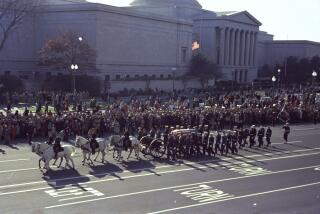Foreign Landscapes Flavor Thanksgiving
- Share via
It is peculiarly isolating, almost desolating, to be in a foreign country on Thanksgiving. No matter how benign everything else about the visitation is, being away on this most American of all holidays makes you piercingly aware where home is.
The Fourth of July is not quite the same sentimental family holiday, although even on the Fourth it’s odd to look around in London or Paris and realize it’s business as usual for everybody else. We are defined by the holidays we keep.
I spent three Fourths of July and three Thanksgivings in England in the early 1960s, and I remember the valiant efforts among us resident aliens to create a turkey dinner in 1962. Stuffed grouse wouldn’t have been the same. Turkeys were available; as I remember it was the cranberry sauce that was a problem.
I would, if I could, forget the Thanksgiving of 1963. The young President was scarcely in his grave and the numbing shock was still on all of us. Beyond the grief, there were the anxieties, the bewilderment, the anger, the unfocusable suspicions--all somehow amplified by our remoteness from the scene and the fact that communications were a quarter-century less instant than they are now.
Like everyone else who was living at the hour of Dallas, I have every minute of it carved in memory. It was late in the day in London; there’d been a flash on the office news ticker about some shots being fired at President Kennedy’s motorcade in Dallas. Then the ticker fell silent.
By a terrible irony some of us had been due to attend the first screening of Stanley Kubrick’s “Dr. Strangelove” at the Columbia offices on Wardour Street. Four of us went out for a quick dinner in nearby Soho.
It now seems unthinkable that we went out, and yet unthinkable was to be the word for that day and all the days that followed. There was no radio in the restaurant but as we left the Italian owner said in a heavy accent, “Sorry your President die.” But the idea that he was dead was even more unthinkable. We told ourselves that the owner had misunderstood a message.
We hurried around the corner to Columbia and were met by a young studio marketing man. His tears said everything and we hardly spoke. We ran-walked back to the office, but part of the horror of the moment was the feeling of uselessness. There was nothing we could do that mattered; all we could do in a far country was wait and listen and speculate.
Weeks later there was a memorial service for John Kennedy in St. Paul’s Cathedral. A brilliant trumpet fanfare echoed across that great domed space, and it was an enormously moving moment, because England had loved Kennedy as Kennedy had loved England.
The intervening quarter-century has not softened the tragedy or assuaged the grief but only defined the tragedy more sharply and demonstrated its impact ever more clearly. The shots--whoever fired them if Oswald did not--deflected the course of American history.
It was a spirit that died: the youthful verve, optimism and idealism matched with a pragmatic gift for politics. Jack Kennedy had a historian’s sense of the American past and a profound awareness that the United States was part of the whole world, that we were all, symbolically, Berliners.
John Kennedy had, not least, a gift of unforgettable utterance unmatched since Franklin Roosevelt and he used it to restate in contemporary terms the founding principles of the American experience, among them the bedrock conviction that every citizen is a special interest. Not since Kennedy’s 1,000 days has political power seemed so clearly a means to altruistic ends and not as an end in itself.
The Thanksgiving season is now forever suffused with memories of J.F.K., and not simply on anniversaries divisible by five. An aura of melancholy inevitably overhangs the day, but there are also the glories to be remembered with thanks. And what you have to hope is that hope itself, of which John Kennedy was a brief and shining image, is still part of the American dream.
More to Read
The biggest entertainment stories
Get our big stories about Hollywood, film, television, music, arts, culture and more right in your inbox as soon as they publish.
You may occasionally receive promotional content from the Los Angeles Times.










